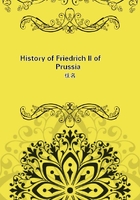
第84章
His wife was a Danish Princess, Sister of poor Christian II., King of that Country: dissolute Christian, who took up with a huckster-woman's daughter,--"mother sold gingerbread," it would appear, "at Bergen in Norway," where Christian was Viceroy; Christian made acceptable love to the daughter, "DIVIKE (Dovekin, COLUMBINA),"as he called her. Nay he made the gingerbread mother a kind of prime-minister, said the angry public, justly scandalized at this of the "Dovekin." He was married, meanwhile, to Karl V.'s own Sister; but continued that other connection. [Here are the dates of this poor Christian, in a lump. Born, 1481; King, 1513 (Dovekin before); married, 1515; turned off, 1523; invades, taken prisoner, 1532; dies, 1559. Cousin, and then Cousin's Son, succeeded.]
He had rash notions, now for the Reformation, now against it, when he got to be King; a very rash, unwise, explosive man. He made a "Stockholm BLUTBAD" still famed in History (kind of open, ordered or permitted, Massacre of eighty or a hundred of his chief enemies there), "Bloodbath," so they name it; in Stockholm, where indeed he was lawful King, and not without unlawful enemies, had a bloodbath been the way to deal with them. Gustavus Vasa was a young fellow there, who dexterously escaped this Bloodbath, and afterwards came to something.
In Denmark and Sweden, rash Christian made ever more enemies;at length he was forced to run, and they chose another King or successive pair of Kings. Christian fled to Kaiser Karl at Brussels; complained to Kaiser Karl, his Brother-in-law,--whose Sister he had not used well. Kaiser Karl listened to his complaints, with hanging under-lip, with heavy, deep, undecipherable eyes; evidently no help from Karl.
Christian, after that, wandered about with inexecutable speculations, and projects to recover his crown or crowns;sheltering often with Kurfurst Joachim, who took a great deal of trouble about him, first and last; or with the Elector of Saxony, Friedrich the Wise, or after him, with Johann the Steadfast ("V. D. M. I. AE." whom we saw at Augsburg), who were his Mother's Brothers, and beneficent men. He was in Saxony, on such terms, coming and going, when a certain other Flight thither took place, soon to be spoken of, which is the cause of our mentioning him here.--In the end (A.D. 1532) he did get some force together, and made sail to Norway; but could do no execution whatever there;--on the contrary, was frozen in on the coast during winter; seized, carried to Copenhagen, and packed into the "Castle of Sonderburg,"a grim sea-lodging on the shore of Schleswig,--prisoner for the rest of his life, which lasted long enough. Six-and-twenty years of prison; the first seventeen years of it strict and hard, almost of the dungeon sort; the remainder, on his fairly abdicating, was in another Castle, that of Callundborg in the Island of Zealand, "with fine apartments and conveniences," and even "a good bouse of liquor now and then," at discretion of the old soul. That was the end of headlong Christian II.; he lasted in this manner to the age of seventy-eight. [Kohler, Munzbelustigungen, xi. 47, 48; Holberg, Danemarckische Staats-und Reichs-Historie (Copenhagen, 1731, NOT the hig Book by Holberg), p. 241; Buddaus, Allgemeines Historisches Lexicon (Leipzig, 1709),? Christianus II.]
His Sister Elizabeth at Brandenburg is perhaps, in regard to natural character, recognizably of the same kin as Christian;but her behavior is far different from his. She too is zealous for the Reformation; but she has a right to be so, and her notions that way are steady; and she has hitherto, though in a difficult position, done honor to her creed. Surly Joachim is difficult to deal with; is very positive now that he has declared himself:
"In my house at least shall be nothing farther of that unblessed stuff." Poor Lady, I see domestic difficulties very thick upon her; nothing but division, the very children ranging themselves in parties. She can pray to Heaven; she must do her wisest.